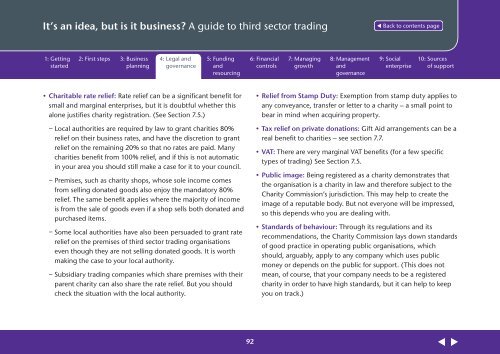A guide to third sector trading - WCVA
A guide to third sector trading - WCVA
A guide to third sector trading - WCVA
Create successful ePaper yourself
Turn your PDF publications into a flip-book with our unique Google optimized e-Paper software.
It’s an idea, but is it business? A <strong>guide</strong> <strong>to</strong> <strong>third</strong> sec<strong>to</strong>r <strong>trading</strong><br />
1: Getting<br />
started<br />
2: First steps 3: Business<br />
planning<br />
4: Legal and<br />
governance<br />
5: Funding<br />
and<br />
resourcing<br />
6: Financial<br />
controls<br />
7: Managing<br />
growth<br />
8: Management<br />
and<br />
governance<br />
9: Social<br />
enterprise<br />
10: Sources<br />
of support<br />
• Charitable rate relief: Rate relief can be a significant benefit for<br />
small and marginal enterprises, but it is doubtful whether this<br />
alone justifies charity registration. (See Section 7.5.)<br />
− Local authorities are required by law <strong>to</strong> grant charities 80%<br />
relief on their business rates, and have the discretion <strong>to</strong> grant<br />
relief on the remaining 20% so that no rates are paid. Many<br />
charities benefit from 100% relief, and if this is not au<strong>to</strong>matic<br />
in your area you should still make a case for it <strong>to</strong> your council.<br />
− Premises, such as charity shops, whose sole income comes<br />
from selling donated goods also enjoy the manda<strong>to</strong>ry 80%<br />
relief. The same benefit applies where the majority of income<br />
is from the sale of goods even if a shop sells both donated and<br />
purchased items.<br />
− Some local authorities have also been persuaded <strong>to</strong> grant rate<br />
relief on the premises of <strong>third</strong> sec<strong>to</strong>r <strong>trading</strong> organisations<br />
even though they are not selling donated goods. It is worth<br />
making the case <strong>to</strong> your local authority.<br />
− Subsidiary <strong>trading</strong> companies which share premises with their<br />
parent charity can also share the rate relief. But you should<br />
check the situation with the local authority.<br />
• Relief from Stamp Duty: Exemption from stamp duty applies <strong>to</strong><br />
any conveyance, transfer or letter <strong>to</strong> a charity – a small point <strong>to</strong><br />
bear in mind when acquiring property.<br />
• Tax relief on private donations: Gift Aid arrangements can be a<br />
real benefit <strong>to</strong> charities – see section 7.7.<br />
• VAT: There are very marginal VAT benefits (for a few specific<br />
types of <strong>trading</strong>) See Section 7.5.<br />
• Public image: Being registered as a charity demonstrates that<br />
the organisation is a charity in law and therefore subject <strong>to</strong> the<br />
Charity Commission’s jurisdiction. This may help <strong>to</strong> create the<br />
image of a reputable body. But not everyone will be impressed,<br />
so this depends who you are dealing with.<br />
• Standards of behaviour: Through its regulations and its<br />
recommendations, the Charity Commission lays down standards<br />
of good practice in operating public organisations, which<br />
should, arguably, apply <strong>to</strong> any company which uses public<br />
money or depends on the public for support. (This does not<br />
mean, of course, that your company needs <strong>to</strong> be a registered<br />
charity in order <strong>to</strong> have high standards, but it can help <strong>to</strong> keep<br />
you on track.)<br />
92












